|
|
|
Sort Order |
|
|
|
Items / Page
|
|
|
|
|
|
|
| Srl | Item |
| 1 |
ID:
165323
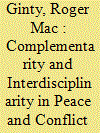

|
|
|
|
|
| Summary/Abstract |
This essay unpacks some of the nuances and complexities of peace and conflict studies. While it accepts that there are divisions between those who study conflict and those who study peace, it argues that there are also multiple sites of overlap and complementarity. Many of those who study topics labeled as “peace” are actually studying conflict, meaning that we have a complex “masala” of peaceandconflictstudies. Moreover, trends within social science research more broadly reflect the increasingly interdisciplinary nature of recent work.
|
|
|
|
|
|
|
|
|
|
|
|
|
|
|
|
| 2 |
ID:
170369
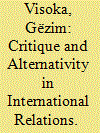

|
|
|
|
|
| Summary/Abstract |
This article critically interrogates the episteme of alternativity in international relations (IR) to rethink the purpose of critical knowledge in global politics. It questions what critical knowledge is for and whose purpose it serves. While alternativity is the very condition that has given rise to critical approaches, there is a deep-rooted division among critical scholars regarding the relationship between criticality and alternativity. This article argues that alternativity provides an opportunity for critical scholars to remain relevant without being affiliated with positivist logics of inquiry. In examining the potential of alternativity, the article explores three modes of alternativity in peace and conflict studies: critique-without-alternative, critique-as-alternative, and critique-with-alternative. It probes the merits and limits of the episteme of alternativity in generating new possibilities for advancing emancipatory interests and saving critical theory from losing its original transformative impetus. In the final part, the article explores future directions for rejuvenating the purpose of critique by exploring the nexus between criticality and alternativity on postparadigmatic and practical grounds.
|
|
|
|
|
|
|
|
|
|
|
|
|
|
|
|
| 3 |
ID:
161140
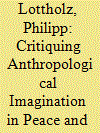

|
|
|
|
|
| Summary/Abstract |
This article seeks to show how the ethnographic peace research agenda can benefit from long-standing discussions in the anthropological literature. It sets out by arguing that the ‘anthropological imagination’ apparent in recent debates in peace and conflict studies is informed by an empiricist positivism that conceives of ethnography as a data-gathering tool. By drawing insights from the ‘writing culture’ and ‘Third World feminism’ debates, I will show how such empiricism was challenged and partly done away with in favour of new dialogical and collaborative approaches to knowledge production. In the second part, focussed on the context of the Kyrgyz Republic in Central Asia, I will illustrate the limits and blind spots of the prevalent empiricist approach to studying peace and conflict by showing how discourses and imaginaries of a ‘culture of peace’, tolerance and multiculturalism conceal forms of exclusion, marginalization and hidden conflict. I will show how my own collaborative research sheds light on community security practitioners’ efforts to understand and tackle security challenges. This practico-discursive analysis exemplifies how critical ethnographic peace research can help to uncover patterns of conflict management, post-conflict governmentality, and the construction and ‘othering’ of group identities.
|
|
|
|
|
|
|
|
|
|
|
|
|
|
|
|
| 4 |
ID:
153030
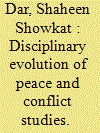

|
|
|
| 5 |
ID:
159416
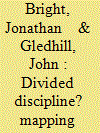

|
|
|
|
|
| Summary/Abstract |
Scholars in the field of peace and conflict studies have long worried that their discipline is divided – between studies of war and war making, and studies of peace and peacemaking. However, empirical research into the existence, extent, and nature of such a division is scarce. We remedy this by addressing two questions: 1) how is work in the field of peace and conflict studies distributed between its two nominal pillars: “peace” and (violent) “conflict”? and 2) to what extent is there communication and exchange between the two sets of studies? Making use of a unique combination of methods, we find that studies of violence hold a dominant position in the field, although there is also a sizable body of work that explores topics of peace, understood as conflict prevention and/or response. That said, we find limited evidence of intellectual exchange between studies of war/making and peace/making. We also find evidence of gendered, regional, and methodological divides. We argue that such schisms may be preventing scholars of peace and conflict from collectively realizing the founding ontological goal of their discipline, which was to understand the causes of war in order to contribute to an understanding of how conflict can be managed peacefully.
|
|
|
|
|
|
|
|
|
|
|
|
|
|
|
|
| 6 |
ID:
158108
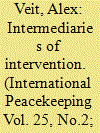

|
|
|
|
|
| Summary/Abstract |
Why do international peace- and state-building interventions regularly fail to transform conflict-ridden countries into liberal states? This paper argues that interventionists’ practices and dependency on local intermediaries help explain the disappointing outcomes of intervention. Based on a relational theoretical approach and original empirical material, the paper compares two of the largest peace- and state-building interventions in recent years. For practical and normative reasons, peacebuilders need to find local partners who help them instil change. However, as partners of peace- and state-building interventions, local elites may appropriate international resources and use them to strengthen their own positions. Interventionists abstain from sanctioning such appropriation as long as their own short-term and purpose-oriented goals are not undermined. Contrary to assumptions in much of the literature, interventionists do not eagerly defend their alleged liberal agendas. Instead, their pragmatism strengthens existing neo-patrimonial figurations rather than fostering fundamental transformation. The paper argues that research should focus on peacebuilders’ actual practices rather than normative statements. Such an approach allows for a better understanding of evolving political orders in conflict societies.
|
|
|
|
|
|
|
|
|
|
|
|
|
|
|
|
| 7 |
ID:
165322
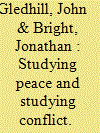

|
|
|
|
|
| Summary/Abstract |
“Peace” and (violent) “conflict” are often seen as conceptual mirror images of one another; peace is the absence of conflict, and conflict is the absence of peace. Given this conceptual interdependence, some scholars see that the study of war-making and the study of peacemaking are complementary—or even functionally identical—academic projects. Others, however, see that studies of violence and war-making are antithetic to studies of peace and peacemaking. The six contributions to this Journal of Global Security Studies forum explore these contrasting perspectives, with a view to assessing the “state of the discipline” of peace and conflict studies (and cognate disciplines, such as security studies). The introduction offers provocations for debate. The two contributions that follow consider connections and disconnections between the study of conflict and studies of postconflict peacebuilding and transitional justice, respectively. The next two contributions focus on areas of investigation that do not fit neatly into either the “peace” or “conflict” categories—gender and nonviolence—and the authors explore how studies of these topics might create bridges between scholarship on peace and studies of violent conflict. The concluding contribution argues that “mainstream” peace and conflict research has come to be dominated by positivist treatments of war and violence, and it draws attention to alternate approaches that have the potential to transform and ameliorate social relations.
|
|
|
|
|
|
|
|
|
|
|
|
|
|
|
|
| 8 |
ID:
185243
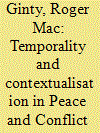

|
|
|
|
|
| Summary/Abstract |
This article contributes to debates on appropriate levels of analysis, temporality, and the utility of fieldwork in relation to Peace and Conflict Studies (PCS), and International Relations more generally. It observes a recentism or privileging of the recent past in our studies and a consequent overlooking of the longer term. As a corrective, the article investigates the extent to which wartime memoirs and personal diaries (specifically from World War I and World War II) can help inform the study of contemporary peace and conflict. In essence, the article is a reflection on the epistemologies and methodologies employed by PCS and an investigation of the need for greater contextualisation.
|
|
|
|
|
|
|
|
|
|
|
|
|
|
|
|
|
|
|
|
|